Has a problem been found?

Repair as necessary and go to "Verification of Vehicle Repair" procedure.

Go to " Power Circuit Inspection " procedure.
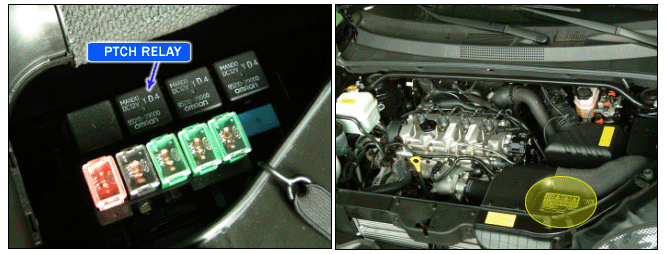
The direct injection engine is characterised by improved thermodynamic efficiency compared to an indiret injection engine, due to the reduction in heat loss via the walls. The coolant is used by the passenger compartment heating system.
In extream cold conditions, it is therefore difficult to reach a comfortable temperature in the passenger compartment.
To reduce the length of the increase in the temperature phase, vehicles powered by direct injection engines are fitted with heating resistors located directly in the cooling circuit.
The electrical power of each water heater component is 300 W. The water heater relay coil is energized to turn on the relay switch, which activates the water heaters by the ECM, according to the signal of water temperature sensor.
The ECM cuts the feed to the water heaters when the period determined by the map has expired or when the coolant temperature exceeds 65 ℃. Supply may also be cut for a moment if the battery voltage drops below 10 V.
If the signal exceeds threshold value, the ECM judged this as a fault and DTC is set.
Item | Detecting Condition | Possible Cause |
DTC Strategy | ● Circuit continuity check | ● Opne or short in power circuit ● Open or short in water heater relay control circuit ● Faulty relay ● Faulty ECM |
Enable Conditions | ● Ignition on | |
Threshold Value | ● Open or short for water heater relay control circuit. | |
Diagnostic Time | ● 1 sec. | |
MIL Fuel Limit Fuel Cut EGR Off | ● No ● No ● No ● No | |
Fail safe | ● EGR valve deactivited ● Fuel quantity limitation |
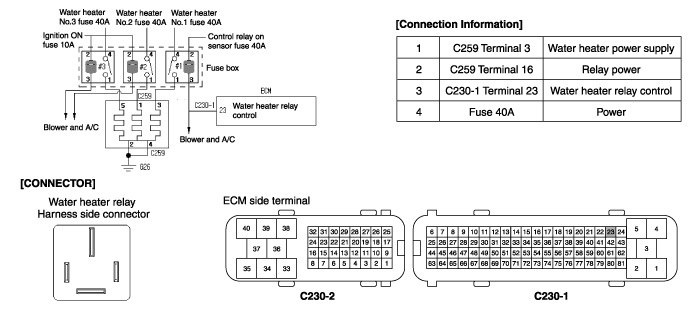
Many malfunctions in the electrical system are caused by poor harness and terminals.
Faults can also be caused by interference from other electrical systems, and mechanical or chemical damage.
Thoroughly check connectors for looseness, poor connection, bending, corrosion, contamination, deterioration, or damage.
Has a problem been found?

Repair as necessary and go to "Verification of Vehicle Repair" procedure.

Go to " Power Circuit Inspection " procedure.
Ignition "OFF".
Disconnect Water heater relay 1.
Ignition "ON" & Engine "OFF".
Measure voltage between terminal 2 of the water heater relay and chassis ground.
Measure voltage between terminal 4 of the water heater relay and chassis ground.
Specification : 11.5V~13.5V
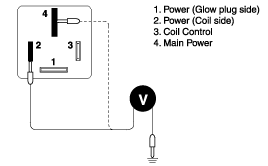
Is the measured voltage within specifications ?

▶ Go to "Control Circuit Inspection" procedure.

▶ Check for open or short in the power harness.
Repair as necessary and go to "Verification of Vehicle Repair" procedure.
Check for short to ground in harness.
Ignition "OFF".
Disconnect water heater relay 1.
Ignition "ON" & Engine "OFF".
Measure voltage between terminal 3 of the water relay and chassis ground.
Specification : Approx. below 1V
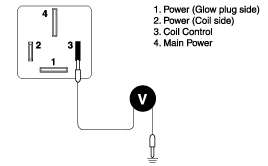
Is the measured resistance within specifications ?

▶ Go to "Check for short to ground in harness" as below.

▶ Check for short to ground in harness.
Repair as necessary and go to "Verification of Vehicle Repair" procedure.
Check for short to battery in harness.
Ignition "OFF".
Disconnect water heater relay 1.
Measure resistance between terminal 3 of the water heater relay and chassis ground.
Specification : Infinite
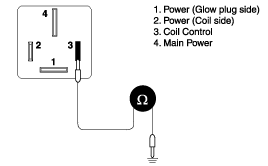
Is the measured resistance within specifications ?

▶ Go to "Check for open in harness " as below.

▶ Check for short to ground in harness.
Repair as necessary and go to "Verification of Vehicle Repair" procedure.
Check for open in harness.
Ignition "OFF".
Disconnect water heater relay 1 and ECM connector.
Measure resistance between terminal 3 of the water heater relay and terminal 23 of ECM harness connector.
Specification : Approx. below 1Ω
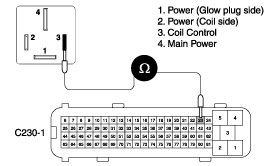
Is the measured resistance within specifications ?

▶ Go to "Component Inspection" procedure.

▶ Check for open in harness.
Repair as necessary and go to "Verification of Vehicle Repair" procedure.
Check water heater relay 1.
Ignition "OFF" & Engine "OFF".
Disconnect water heater relay.
Measure resistance between terminal 2 and 3 of water heater relay connector (Component side).
Specification : 50 ~ 60Ω
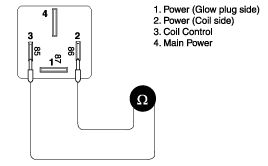
Is the measured resistance within specifications ?

▶ Go to " Check for water heater relay operation " as below.

▶ Substitute with a known-good Main relay and check for proper operation.
If the problem is corrected, replace main relay and then go to "Verification of Vehicle Repair" procedure.
Check water heater relay operation.
Ignition "OFF" & Engine "OFF".
Connect water heater relay 1,2 and 3 and disconnect ECM connector.
Connect volt meter or test lamp with terminal 3 of water heater connector.
Ignition "ON" & Engine "OFF".
Ground terminal 23 of ECM harness connector to operate water heater relay. Or,
Check that water heater relay operates after Engine starts(Perform this test under 60°C).
Time to operate water heater relay should not be over than 3 sec.
Because water heater plug can be damaged or Battery can be discharged.
Is the power supplied to water heater plug by operating water heater relay ?

▶ Substitute with a known-good ECM and check for proper operation.
If the problem is corrected, replace ECM and then go to "Verification of Vehicle Repair" procedure.

▶ Substitute with a known-good ECM and check for proper operation.
If the problem is corrected, replace ECM and then go to "Verification of Vehicle Repair" procedure.
After a repair, it is essential to verify that the fault has been corrected.
Connect scan tool and select "Diagnostic Trouble Codes(DTCs)" mode and then clear DTC.
Operate the vehicle within DTC Enable conditions in General information.
Are any DTCs present ?

Go to the applicable troubleshooting procedure.

System is performing to specification at this time.